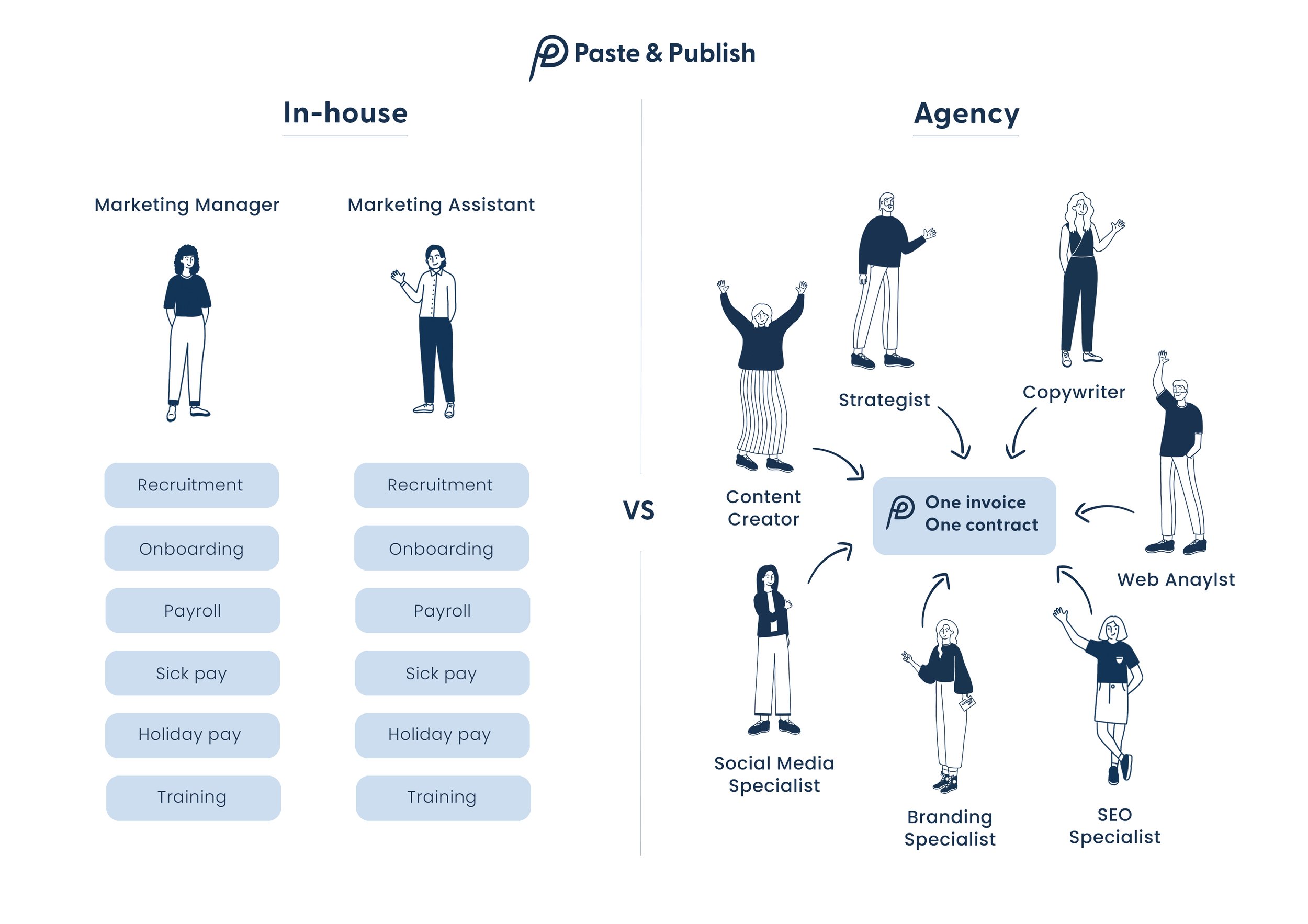In-house marketing vs an agency: The surprising truth
Key takeaways
Marketing agencies tend to be more cost-effective when considering the time and money it takes to recruit, onboard, and manage an employee (or team of experts).
They also provide quicker access to the market and a broader, more consistent skillset. But this comes at the cost of not having them in your company and constantly available.
There’s a secret third option: the hybrid approach. You can have a small in-house marketing team and still outsource some of the activities to an agency. This way, you get the best of both worlds.
Marketing agencies tend to be more cost-effective.
But having an in-house team means you have constant access to them.
So what’s most important when it comes to opting for in-house marketing vs. outsourcing?
That’s what we’ll be talking about here.
(And the truth might surprise you).
In this guide comparing in-house marketing with hiring an agency:
What is the difference between in-house marketing vs. a marketing agency?
What to consider when choosing between the two
The costs of in-house marketing vs. a marketing agency
In-house versus external teams
A hybrid approach
What is the difference between in-house and agency marketing?
In-house marketers are employees hired by a company to work alongside the wider team and focus on that one brand.
Marketing agencies are specialists that companies can hire to manage all or some aspects of their marketing activities. They usually have a portfolio of clients.
What to consider when choosing between in-house marketing vs. a marketing agency
Marketing is a fast-paced, fast-evolving industry.
Hiring a marketing agency is a shortcut to acquiring specialist skills and expert industry knowledge.
You can start creating assets and generating results right away. You’re probably not their only client, but maybe that’s a good thing.
Having a team in-house means they live and breath your brand.
They’re connected to the bigger picture, and are always accessible. But it takes time and money to hire and train them.
So how do you choose between the two?
Here are the top factors to consider when weighing up an in-house marketing team vs. an hiring an agency:
A deeper dive into the costs of an in-house vs outsourced marketing team
Recruitment can be a costly, time-consuming process.
A study by Glassdoor found that the average US employer spends about $4,000 and 24 days hiring a new employee. It can be much more than that.
Then there’s training.
“Training turns out to be one of the costliest investments a company can make.
According to a recent study by Training Magazine, companies spent $92.3 billion in 2020-2021 on training. During the same year, employees devoted an average of 64 hours to training.
And those aren't necessarily only new hires who would not only require the same on-the-job training and continuing education as current employees, but the additional hours, cost of orientation, and initial job training as well.”
Next up comes salary and benefits.
“According to Joe Hadzima, a columnist for the Boston Business Journal and senior lecturer at MIT's Sloan School of Management, the salary plus benefits usually totals "in the 1.25 to 1.4 times base salary range."
Hence, the salary-plus-benefits package for an employee who makes $50,000 a year could equal $62,500 to $70,000.”
The cost of integrating a new recruit into their work environment should not be understated. The office might need new equipment and furniture to accommodate them.
Harvard Business School conducted a study into how long it takes new recruits to reach their “breakeven point”. In other words, when their productivity started to return on the investment it took to hire them.
A mid-level manager needs to be in their job for around six months to reach this point.
This is what that productivity scale might look like:
Weeks > Productivity
1 - 4 > Post-training, around 25% productivity which is a 75% loss of their salary.
5 - 8 > Around 50% productivity, with 50% loss.
9 - 12 > Usually around 75% productivity, 25% loss.
12+ > It’s expected that employees reach their full productivity.
Hiring an agency is a quicker solution.
There’s a short teething period while the agency gets to know your brand and team. But there’s no training or onboarding. There’s no break in productivity due to sickness, holidays, or employees leaving.
You can pay an agency a limited hourly, monthly, or project fee for specific tasks, or outsource your entire marketing strategy and execution.
For example, at Paste & Publish, we offer three different pricing structures to suit you. These change based on how much input you need from us.
Marketing agencies might appear more costly at first glance. But when you consider what goes into recruitment and managing employees, it’s not so black and white.
Plus, with agencies, you should have a clearer understanding of the return on investment over time.
What an in-house team versus outsourced team looks like
With an outsourced team of specialists at your disposal, you typically have a wider range of skillsets available to you:
The best part?
You can tap into these skills as and when you need them. Not every campaign will require the same expertise, and with an agency, you have flexibility.
Get the best of both with a hybrid approach…
Good news!
If you’ve got to this point and you’re still a little stumped, you don’t have to choose one or the other.
Plenty of companies have both in-house marketing teams and agencies too.
This way, they can leverage the best of both worlds.
Our done with you offering allows for exactly this. And we’ve had huge success working with clients this way.
Get in touch for an honest chat about the best option for you.



